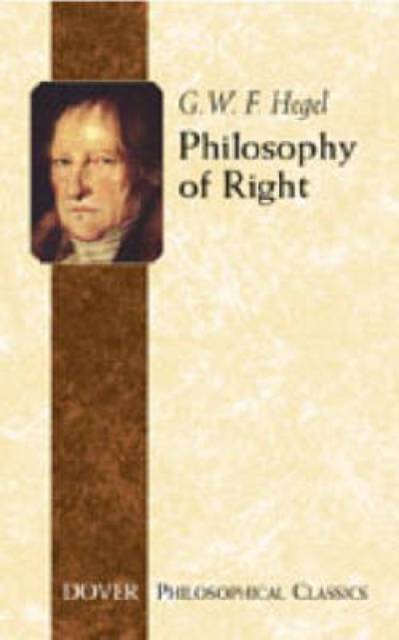
Je cadeautjes zeker op tijd in huis hebben voor de feestdagen? Kom langs in onze winkels en vind het perfecte geschenk!
- Afhalen na 1 uur in een winkel met voorraad
- Gratis thuislevering in België vanaf € 30
- Ruim aanbod met 7 miljoen producten
Je cadeautjes zeker op tijd in huis hebben voor de feestdagen? Kom langs in onze winkels en vind het perfecte geschenk!
- Afhalen na 1 uur in een winkel met voorraad
- Gratis thuislevering in België vanaf € 30
- Ruim aanbod met 7 miljoen producten
Zoeken
€ 13,45
+ 26 punten
Omschrijving
Complete and unabridged, this edition of Georg Wilhelm Friedrich Hegel's 1821 classic offers a comprehensive view of the philosopher's influential system. In the Philosophy of Right, Hegel applies his most important concept -- the dialectics -- to law, rights, morality, the family, economics, and the state. The last of Hegel's works to be published in his lifetime, this volume combines moral and political philosophy to form a sociologic view dominated by the idea of the state. Hegel defines universal right as the synthesis between the thesis of an individual acting in accordance with the law and the occasional conflict of an antithetical desire to follow private convictions. The state, he declares, must permit individuals to satisfy both demands, thereby realizing social harmony and prosperity--the perfect synthesis. Further, Hegel renounces his formerly favorable assessment of the French Revolution and rejects the republican form of government, suggesting instead an idealized form of a constitutional monarchy, in which ultimate power rests with the sovereign.
Specificaties
Betrokkenen
- Auteur(s):
- Vertaler(s):
- Uitgeverij:
Inhoud
- Aantal bladzijden:
- 272
- Taal:
- Engels
- Reeks:
Eigenschappen
- Productcode (EAN):
- 9780486445632
- Verschijningsdatum:
- 20/09/2005
- Uitvoering:
- Paperback
- Formaat:
- Trade paperback (VS)
- Afmetingen:
- 133 mm x 210 mm
- Gewicht:
- 240 g

Alleen bij Standaard Boekhandel
+ 26 punten op je klantenkaart van Standaard Boekhandel
Beoordelingen
We publiceren alleen reviews die voldoen aan de voorwaarden voor reviews. Bekijk onze voorwaarden voor reviews.









